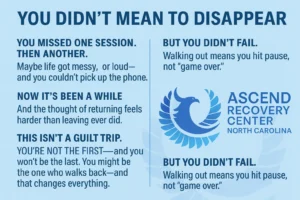You didn’t mean to disappear.
Maybe you missed one session. Then another. Maybe life got messy, or heavy, or just loud—and you couldn’t make yourself pick up the phone.
Maybe shame crept in before you even realized what was happening. Or maybe you told yourself you’d go back next week. Or next Monday. Or after things “settle down.”
Now it’s been a while. And the thought of returning feels harder than leaving ever did.
We get it. At Ascend Recovery Center’s IOP in Charlotte, we’ve seen it more times than we can count. And we’ve seen what happens when someone stops waiting for the perfect moment and just… comes back.
This isn’t a guilt trip. This is a hand held out. You’re not the first person who walked away, and you absolutely won’t be the last. But you might be the one who walks back—and that changes everything.
1. You Didn’t Fail—You Hit a Human Moment
Walking out of IOP doesn’t mean you failed recovery. It means you hit a wall, a moment, a pause.
It could have been burnout. Overwhelm. Conflict. Relapse. Embarrassment. Or nothing dramatic at all—just a subtle drift away. That’s human.
Sometimes we ghost because we’re ashamed. Sometimes because we’re scared. Sometimes because we’re tired of talking.
And sometimes because we’ve never been in the habit of letting people help.
Whatever the reason, it doesn’t mean you’re weak. It means you’re human—and humans come back all the time.
2. Returning Doesn’t Require a Perfect Story
You don’t have to prep a speech. You don’t have to make your absence make sense.
Recovery doesn’t demand a dramatic return. It allows a quiet one.
At Ascend Recovery Center in North Carolina, we’re not waiting to interrogate you. We’re just glad to hear your voice. All it takes is one call. Or one message. Or one moment of “Hey… can I come back?”
We won’t guilt you. We won’t make you rehash everything unless you want to. We’ll pick up from where you are now—and move forward together.
3. IOP Is Built for Real Life (Including Disappearances)
Let’s be honest—IOP isn’t for people with perfect attendance and clean timelines.
It’s for people who are trying. People who get overwhelmed. People who flinch at vulnerability, backpedal when it gets hard, and sometimes need to step away before they can really lean in.
If you think you broke the rules by leaving, here’s a better perspective:
You hit pause. Now, you get to press play again.
And you don’t have to earn your way back. You’re still in this.

4. Whatever Work You Did Still Counts
Maybe you were in IOP for a few weeks. Maybe longer. And maybe it doesn’t feel like you made progress. But here’s the thing:
Even if you walked away mid-process, that doesn’t erase what you did.
You showed up. You shared things you hadn’t said out loud. You learned about your patterns, your triggers, your limits. You started the work—even if it scared you.
Coming back isn’t starting over. It’s resuming a conversation with yourself that matters.
5. The Hardest Step Isn’t the First One—It’s the Return
Starting IOP was vulnerable. But returning? That’s a whole other kind of courage.
It means facing the part of you that wants to give up. It means acknowledging that this matters to you more than your pride.
That’s powerful.
Because anyone can ghost. Anyone can disappear. But the person who circles back and says, “I still want this”? That person is already changing the story.
6. It’s Okay If You Relapsed
A lot of people avoid returning because they’re ashamed. Especially if they used again after leaving.
But let’s say this clearly: Relapse isn’t failure. It’s information. It’s common. It’s part of many people’s recovery.
If you’re using again, you’re not disqualified. You’re not broken. You’re still welcome. Always.
Our intensive outpatient program in Charlotte isn’t for perfect people. It’s for people who want to get real, get help, and start again—whether that’s your first time or your fifth.
7. You Can Come Back Quietly (But You Won’t Be Alone)
There’s no dramatic spotlight. No therapist waiting with a clipboard. No group ready to interrogate you.
You can come back with one phone call. Or one email. We’ll ask what you need, where you’re at, and how we can support you moving forward.
Then we’ll do just that—move forward.
The most important thing isn’t why you left. It’s why you came back. And that reason—whatever it is—is valid enough.
FAQs: What to Know If You’re Thinking About Coming Back to IOP
Will I have to start from the beginning?
Not necessarily. We’ll assess your situation and see where you’re at emotionally, mentally, and physically. Sometimes people resume where they left off. Other times, we rework the schedule or support structure. It’s customized to your needs now—not your past.
Will people in group know I left?
Maybe. Maybe not. Either way, no one’s keeping score. Most people in IOP know what it’s like to take a step back—they’re not judging. They’ll be glad to see you. Some of them might have done the same thing before.
What if I’m embarrassed to return?
Totally normal. Also totally surmountable. Embarrassment fades faster than regret. We promise: the moment you walk through the door, relief starts to replace shame.
Can I come back if I used while I was out?
Yes. 100%. You’re not the only one, and you’re not out of chances. We’ll help you stabilize, recalibrate, and rebuild safely.
What if I’m not sure I want to commit again?
That’s okay. You don’t need to be all-in overnight. Sometimes, just showing up and having the conversation is enough to shift something inside. Let’s start there.
How do I actually return to the program?
Call (866) 606-5732 or visit our IOP program page. No paperwork. No shame. Just a next step.
This Isn’t the End of Your Story
You might think the walk-out ruined your shot. That too much time has passed. That everyone’s moved on.
They haven’t. We haven’t. You haven’t.
Whatever led you away, it doesn’t have to keep you gone. There’s a version of you who kept reading this post. That’s not nothing. That’s wanting something else.
And that’s where we begin.
Because you don’t have to crash to restart. You don’t have to explain everything. You just have to take one step—toward someone who still believes in your comeback.
Call (866) 606-5732 or visit Ascend’s intensive outpatient program in Charlotte to take the next quiet, real, brave step. You don’t need to earn your place. It’s already waiting for you.


